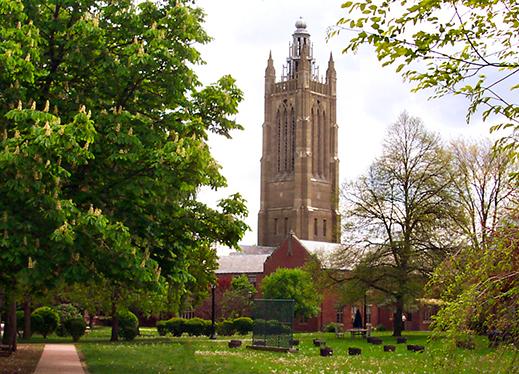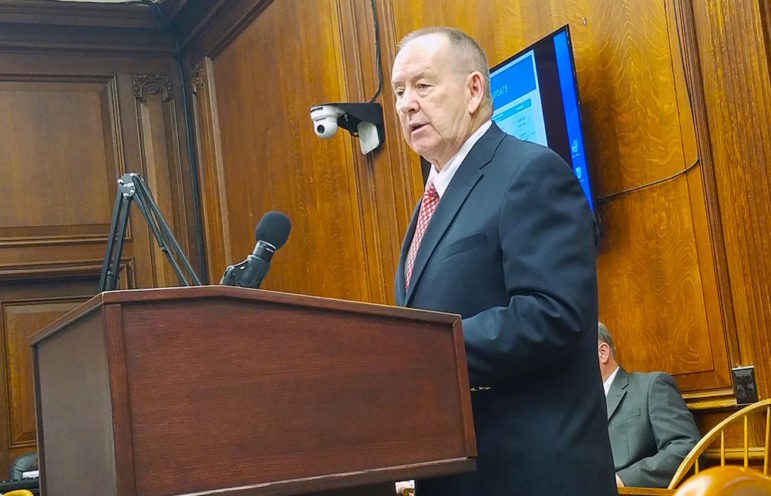
A piece of paperwork that was filed late has put Perkins School for the Blind and the Town of Watertown at odds over whether the school should pay nearly $1.5 million in taxes on its property or if the school be exempt from taxes, as it has operating as a non-profit in town for more than a century.
A third option has been proposed, which would cost less than the full tax bill, but over the years would add up to far more than the $1.4 million. Perkins President and CEO Dave Power said the payment would take money away from the school’s mission of providing services to blind and visually impaired children and adults.
The missed filing occurred in March 2019, but the issue became public Tuesday night at the Town Council meeting. Perkins School for the Blind faces a $1.4 million tax bill for missing the deadline, and Tuesday they asked asked Town officials to make an exception and accept the non-profit declaration after the deadline.
The Town does not have the authority to waive the tax bill on its own, Town Manager Michael Driscoll said. Town officials have offered help seek legislative approval to give the full abatement of the tax bill for Fiscal Year 2020.
Kim Charlson, executive director of the Perkins Braille & Talking Book Library, told the Council that many feel Perkins is not being treated fairly.
“Speaking on behalf of the blindness community of Watertown, this response by the Town seems to be an unfair and extreme reaction for an inadvertent administrative filing error,” said Charlson, who also serves on the Watertown Commission on Disability.
The decision over whether to accept the late filing does not fall to the Town Council, said Watertown’s Town Attorney Mark Reich, it is up to the Board of Assessors. And there is a deadline looming at the end of January, when the tax bill would be official.
Driscoll said that some have called the $1.4 million charge a “penalty,” but he denied that. Rather it is a tax assessment on the Perkins property, which he said had to be levied after the school failed to file the paperwork on time.
“The Assessors took absolutely no satisfaction in including the property on the tax roll, but they are bound to follow the assessment statutes,” Driscoll said.
Town Council President Mark Sideris said the Town Council is proud to have Perkins in Watertown, and said he hopes the school can meet with the Board of Assessors “to discuss potential remedies to what we all agree is an unfortunate situation.”
“Since the September meeting, no one from Perkins has scheduled a follow up meeting with Watertown staff to continue discussions,” Sideris said. “I can assure everyone that Watertown’s Assessor and attorney remain ready and willing to meet with Perkins.”
Timeline
The failure to file the form for non-profit tax exempt status, called a 3ABC, occurred due to an error by the Perkins staff, Power said.
“The controller worked at Perkins for 30 years. She retired and the new controller — during the hand off, that is when the formed slipped,” Power said. “No body had any idea the consequence would be $1.4 million.

Officials from Perkins and the Town, as well as their attorneys, have gone back and forth since June 14 when the school received a letter from the Assessor’s office saying that the school missed the deadline and now owed the taxes based on value of the Perkins property.
On July 16, the school hand delivered the form, and Power noted that the Town’s tax filing instruction said, “The board of assessors may extend the filing deadline if you make a written request and show sufficient reason for not filing on time.”
Three days later, the Assessor, Earl Smith, denied the request for Perkins to file late, saying that that Board of Assessors does not have the authority to do so. Power said Perkins looked into the question of who can grant exception, contacting the Massachusetts Department of Revenue, which told them it was a decision made at the municipal level.
Driscoll contends that the decisions to exempt the tax payment is not one that can be made by Town officials. On Sept. 18, the Assessor met with legal representatives of Perkins, Driscoll said.
“At that time, in response to requests from the Perkins representatives that the Assessors act unilaterally to exempt the property notwithstanding the lack of statutory authority to do so, the Town offered to seek authority from the Legislature to exempt the property for fiscal year 2020 as part of an overall discussion that would include the implementation of a PILOT Agreement between Perkins and the Town,” Driscoll said.
While the Assessors do not have the authority to unilaterally abate Perkins’ tax bill, Driscoll said the Town has offered to help get legislative approval to abate Perkins’ tax bill as part of an overall discussion that would include the implementation of a PILOT Agreement between Perkins and the Town. The payment to the Town would be a fraction of the amount that the school would pay in taxes. The initial offer was to have Perkins pay $240,000, or about 16 percent of the tax bill, and the amount would increase 2.5 percent each year, Driscoll said.
Worried that the Town may not be treating all non-profits in town equally, in November Perkins requested to see the 3ABC filing of other organizations over the past five years. Power said they never received the documents.
The Assessor reached out to Perkins officials, offering to meet anytime during the month of December to discuss a potential agreement, Driscoll said, but he never received a response.
Power said he has personally met with Watertown’s State House delegation, the Attorney General and the Governor, and said they “have all expressed disappointment at the Town’s action, but indicated that it is a local issue.”
Power hopes to get the non-profit paperwork accepted late before Jan. 31, 2020, which is when they believe the tax assessment may be irreversible.
PILOT
Town officials also seek to come up with an agreement for Perkins to make a payment in lieu of taxes (PILOT) in which it is proposed that Perkins pay $240,000 to the town the first year.
“Therefore, the true question is whether Perkins is willing to join other exempt organizations in Watertown and enter a PILOT Agreement with the Town that will provide for payments that are a fraction of the taxes that would otherwise be assessed to the Perkins campus,” Driscoll said.

Power said that Town officials are combining two issues — accepting the late filing of the non-profit paperwork and the PILOT — but he does not believe they must go hand-in-hand. He added that, in the long run, the PILOT would end up costing the school far more than the $1.4 million tax bill.
“They are said you can get legislative relief. Now they are saying they will only do it if you enter into a PILOT agreement,” Power said. “It feels like a bit of a shake down.”
Power said the PILOT agreement would last 20 years, with the expectation that it would roll over and continue after that. With the 2.5 percent annual increase, Perkins officials calculates it would cost the school $6.3 million over 20 years. He said Perkins has already filed the non-profit tax exemption paperwork for next year, and does not anticipate that Perkins will have to pay any taxes that year.
Driscoll said Tuesday that the PILOT offer follows the Town Council’s Budget Policy Guideline, which directs the Town Manager to “Actively seek Payment in Lieu of Taxes (PILOT) agreements with each non-profit organization owning or purchasing property in Watertown.”
Driscoll noted that PILOT agreements in other towns often call for the non-profits to pay 25 percent of the tax bill to the city or town. In Watertown, Tufts Health Plan pays $900,000 a year, he added.
Power said only six entities in Watertown have PILOT agreements with the Town, none of which are schools. Some examples, he said, are Mount Auburn Cemetery, Tufts Health Plan and the Sons of Italy.
One reason for a PILOT, Driscoll said, is to cover costs of services the Town provides to the school. He noted that in 2018, the Watertown Police and Fire departments made 200 service calls to the campus.
Power said the school has always had a very positive relationship with the Town’s first responders.
“Fire and Police love Perkins and we love them,” Power said. “They are so protective of the school and students. No one has ever said we are burden to the police and fire department.”
Driscoll also said that Perkins has an endowment of $280 million, as of 2018.
Perkins was formed in 1829 as the first school for the blind in the United States, and moved to Watertown in 1912. While Perkins does not pay taxes, the school gives a great deal back to the community, Charlson said.
“Perkins has an outstanding track record as an active, contributing member of the Watertown community both economically and culturally,” Charlson said.
The endowment goes toward serving blind and visually impaired students from Watertown, New England, across the country and even countries across the globe, Power said. Perkins has educated many Watertown students including several this year, Power said.
“We charge a tuition, that is set by the state, which covers 75 percent of the cost of educating a student from Watertown. The rest we kick in,” said Power, who estimates that Perkins paid $400,000 for the students from Watertown. They must also make up the difference for students from other communities.
The school also provides free accessible library services to Watertown residents, and the school hosts annual retreat for Watertown special education professionals free of cost, Charlson said. Perkins partnered with Town and State officials to design and support the Braille Trail in Watertown’s Riverfront Park.
Students and staff support local restaurants with braille menus “to support Watertown in its work to be inclusive,” Charlson said, and Perkins keeps the gates to its campus open to allow the public to “enjoy our open space and accessible playgrounds.”
Town Council Reaction
Members of the Town Council said they have been contacted by representatives from Perkins. While they may not be able to wipe the tax bill off the books, some of the Councilors said they want to see the issue resolved.
“I hope the Town and Perkins can have an amicable discussion and come to a good agreement,” said District B Councilor Lisa Feltner, in whose district Perkins is located. She added she hopes it can be taken care of before the Jan. 31 deadline.
Councilor Tony Palomba encouraged his colleagues to agree to send a letter in support of coming to an agreement with Perkins at the next Town Council meeting.
“The Town Council cannot weigh in on the Board of Assessors’ decision, but we can write a letter expressing our opinion,” Palomba said.
{Correction: The original version of the story incorrectly state that Watertown officials offered to abate Perkins taxes if it joined a PILOT agreement. The Town does not have the authority to do so, and must get legislative approval of the abatement.}
From the story
“Kim Charlson, executive director of the Perkins Braille & Talking Book Library, told the Council that many feel Perkins is not being treated fairly.”
I feel the same way every time I get a tax bill from Watertown. Why am I paying so much and getting so little. I do think Perkins should be paying something. Not only have they been getting a substantial tax break but when families move to Watertown for Perkins the town also has to foot that bill for the child to go to Perkins.
What would the town do if a homeowner moved into a property and missed the filing of the residential exemption form? Of course they would collect the full amount and not apply the discount.
I’m sick of Watertown and I am not alone.
So now it’s going after blind people? How compassionate.
Watertown is getting how many tens (or is it hundreds?) of millions in new tax revenue with all the new construction on Arsenal Street and elsewhere but one has to dodge pot-holes, cracks, and sink-holes while driving down Mt. Auburn Street not to mention just about everywhere else? Running out of asphalt are we you creeps?
How many millions in car damage does this cause every year? What is going with you elected “officials”? Gone fishin’?
I was thinking sometime back, how hard is it to RE-paint left arrows on the 2 left hand lanes on Galen Street northbound just before you enter the intersection with Mt. Auburn?
Oh, I get it. Makes it easier for the cops to ticket people who don’t know those lanes are left turn only. Nice trick. Or maybe you ran out of paint?
How much revenue do the cops generate from unfair ticketing in Watertown Sq. every year? Let’s have the figures, town manager. And then please resign.
Hmmm, “the Watertown Police and Fire departments made 200 service calls to the campus”
Yet they want to not give anything back. Apparently the leadership of Perkins think we are all blind.
Have some compassion for these children with disabilities.It is so sad to see these young children in & about Watertown trying to maneuver around town. God forbid it could be in any family. Let us receive taxes from all the condo’s that have taken over are once great town along with the restaurant’s bar’s hotel’s & Arsenal Yard. ( HAVE A HEART FOR THESE UNFORTUNATE CHILDREN) School’s provide the best education for our children yet these children with sever disabilities to not receive the dignity as students in our public school’s. Our fire & police department help all our citizen with so much medical knowledge to help someone in need . no need to advertise that they had 200 medical call. Image how many people live @ the school. do you not except any medical calls with all those children’s living their. Each & everyone should take an 1hr in the spring to see the children, then you can have a meeting to see how badly these parents are trying to get help
Watertown’s Town Manager move is punitive to an extreme, Michael Driscoll is the bureaucratic Ebenezer Scrooge. With comments like this, one is reminded “ARe there no prisons, no work houses”:
“Driscoll said that some have called the $1.4 million charge a “penalty,” but he denied that. Rather it is a tax assessment on the Perkins property, which he said had to be levied after the school failed to file the paperwork on time.”
“Driscoll noted that PILOT agreements in other towns often call for the non-profits to pay 25 percent of the tax bill to the city or town.”
What is the Public funds if not for the public good? Taxes aren’t being collected on the real estate developers flocking over Watertown like locust, ramping up real estate prices and adding millions of dollars by indirectly changing tax assess values of your homes, while they aren’t paying their fair share due to agreements with Watertown and Mr. Driscoll.
Finally, think about this carefully, why stop at a school for the blind?
The Resident, Brigham House, and Watertown Health Center are all fair game. Why shouldn’t the elderly, injured veterans, and general public not be taxed for use of these places? Mr. Driscoll has not referred to any other Non-profits, so even if Perkins School for the blind is the first, it will not be the last. If Watertown residents want that for their parents, family, and friends, then it’s just another sign of how shameful our society has become during this era.
Thanks for your comment. A reminder that you can only comment once on a story if you do not sign your full name.